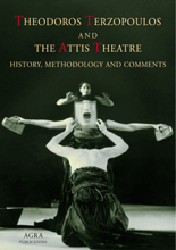 |
|
Photo by Johanna Weber |
|
|
|
Born in the village of Makriyalos, N. Greece. He attended
the |
 |
|
Photo by Johanna Weber |
|
|
|
Born in the village of Makriyalos, N. Greece. He attended
the |
|
THEODOROS TERZOPOULOS |
||
|
HISTORY, METHODOLOGY AND COMMENTS |
||
|
Terzopoulos shook the Greek theatrical landscape in
1986 with his production of the Bacchae. His presentation was a radically
groundbreaking initiative advocating the disengagement of tragedy from
the scenic bonds of traditional interpretation and established prototypes.
The concept of violence guides the viewer through the performances of
the ATTIS theatre enabling him to decode Terzopoulos' scenic idiom:
PHYSICAL VIOLENCE and RITUAL VIOLENCE. In Terzopoulos' theatre myth is not fairytale, it
is condensed experience; the process of rehearsal is not the performance
of a dramatic concept, it is an adventure on a journey to the landscape
of memory, a search for the lost keys of unity between body and speech,
the word as natural entity, a topic which Holderlin has mentioned in
his notes on the translations of Sophocles' works. I saw the performance
twice and both times I saw something new. His work expresses the essence of tragedy in an original
and contemporary way. That's why I strongly believe that his work and
its underlying ideas must be relayed to coming generations. At present
his work is recognized in all five continents. Seeing is seeing a picture true. Many pictures. That
is what I still remember clearly with a space to re-remember and think.
That is for me what makes this work so special.
|
||
 |
||